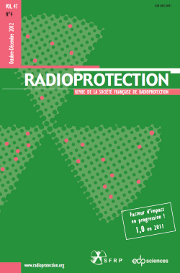Article contents
The EURANOS cooperative framework for preparedness and management strategies of the long-term consequences of a radiological event
Published online by Cambridge University Press: 16 September 2010
Abstract
Experience following the Chernobyl accident in the CIS and the EU has clearly demonstrated that policies and strategies for long-term management of extensive contaminated areas must give due importance to social, cultural, ethical, environmental, economic and political factors beyond the sole radiological protection and health perspective. What is at stake in the long-term response to such a situation is the sustainable rehabilitation of living conditions in affected territories, in a context in which each person can actively contribute to his own protection. Preparing or developing rehabilitation of living conditions in a territory affected by long-lasting radioactive contamination is a broader issue of governance as it must address all affected dimensions and articulate the actions of the various concerned actors at the local, regional and national level. To respond to this challenge, a specific research project was implemented by Mutadis, CEPN, NRPA and AgroParisTech from April 2004 to June 2009 in the framework of the EURANOS integrated programme. The overall objective of this project was “to develop a strategic and methodological framework that can inform or assist national authorities in Europe in establishing arrangements for the long-term management and the sustainable rehabilitation of living conditions in extensive areas that may be contaminated as a result of an accident or malevolent act involving radioactive material”. The proposed framework describes a two-steps method allowing national and local authorities together with key stakeholders to establish arrangements and preparation strategies in the perspective of long-term management of a radiological event. It may also be used to develop rehabilitation strategies in countries affected by long-lasting radioactive contamination. This framework aims to set up favourable conditions for stakeholders (in particular local communities) to engage effectively and sustainably in the cooperative development of post-accident preparation or management strategies. The first step of the method aims to frame the issue and identify conditions for stakeholders to engage in rehabilitation preparedness or management strategies. The second step aims to develop a local-national cooperation platform gathering local and national, private and public actors to develop together preparation or management strategies.
- Type
- Article
- Information
- Copyright
- © EDP Sciences, 2010
- 9
- Cited by




